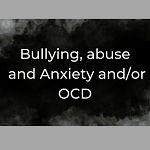In my work as a therapist, I specialise in working with those who are wanting to move themselves away from severe Anxiety and/or OCD. I find that a great proportion of the people wanting this exact kind of help are people who have experienced some form of bullying or abuse – whether this was from other children at school when they were a child, from a sibling or other family member, or later on, in a workplace context, perhaps from a boss or a group of bosses. I would say that in my experience – and of course this is unscientific and anecdotal etc – but in my experience, it’s around 80 or 90%.
Does this mean that the bullying causes the Anxiety and OCD? (And, in some cases, also the depression and PTSD?) Does this mean that the person who did the bullying caused the Anxiety and OCD?
It’s a complex question, and one that my clients often wrestle with as we work together in therapy and they shift their ideas on things around – this way and then that way, putting together different narratives and different perspectives on their life so far.
On the one hand, I want to acknowledge the intense suffering of people who are bullied or abused. And I do think personally that, over time, there is a certain level of unavoidable emotional and mental impact from continual bullying or abuse, whatever the person being bullied experiences beforehand, whatever their overall environment is, and however they choose to, or are or are not able to respond.
If people around you, especially a lot of people around you (and/or people / a single person who you depend on, or who are very significant to you, or have power over you in some way), consistently say very negative things to you and/or about you, doesn’t this make it a whole lot more likely for you to end up repeating negative thoughts in your own head, or to develop a deep sense that there is something wrong with you? If others around you attack you either physically or emotionally, or threaten you, or trick you, or deliberately attempt to humiliate you on an ongoing basis…. What does that do to your trust in other people? What effect does that have in terms of how anxiously or not you might regard other people or future events? What impact does that have on your view of the world, and how likely things are to go well, or not?
On the other hand, from a strict Solution Focused Hypnotherapy point of view – as well as from a strict Neuro Linguistic Programming point of view – no, the bullying did not cause the Anxiety and/or OCD, and no the person who did the bullying did not cause the Anxiety and/or OCD. Or at least not directly. In these disciplines, as practitioners and therapists, we would talk about how those challenging and abusive, and perhaps horrific, experiences would be related in some way to certain thought patterns and beliefs getting established in the brain –
(Though even this is not a direct causational thing, because of course how one person reacts and responds to bullying or other abuse will be different from how another person responds, depending on different factors such as what that person’s early childhood was like / what their support network is like at the time of the bullying / what that individual’s personality / learning style is like and so on….).
And then it is those patterns of thought and belief, laid down in the brain, that lead to the Anxiety and/or OCD. This is a very major distinction, and an important one, because it makes things much more hopeful – unfortunately, there is no way to go back in time and make it so that the bullying or abuse someone endured did not happen, and if there was actually a completely direct link between the bullying or abuse and the Anxiety / OCD, this would mean that there was no hope of recovery to full mental wellness and health.
However, if we are seeing things as being less direct, less simple, if we are acknowledging this ‘in-between’ step of what happens in someone’s brain as they respond and react to a situation of bullying or abuse, then the situation becomes more hopeful – because we can absolutely change what is happening in the brain – we can change the thought patterns, change the beliefs. And that means that full recovery is possible








